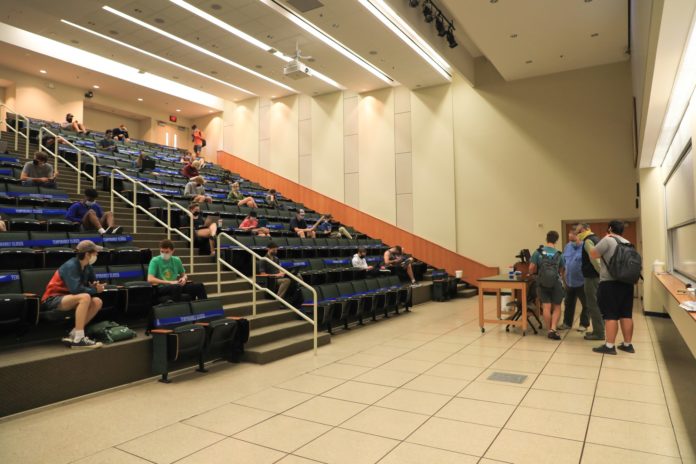By Ava Dunwoody | Staff Writer
Course evaluations are now open and Baylor’s office of institutional research is pushing for students to complete them via reminders and Canvas notifications. With most due on Dec. 3, these anonymous surveys are used for faculty development each semester.
The online evaluations consist of six statements (such as “The instructor clearly explained the subject matter.”) to which students select a response ranging from “Strongly Agree” to “Strongly Disagree.” There are also text boxes to allow for written responses and other comments.
“Student evaluations are an opportunity for the students to express how well their class went and how the instructor did,” said Dr. Gary Carini, vice provost for institutional research and professional education.
When the data comes in from student evaluations, Carini said he helps organize it by analyzing trends and categorizing it by school, department or professor. He then presents this information to the provost, who uses it to interpret how the university is doing. The data is also given to department chairs who then communicate with the professors under their wing.
Dr. Corina Kaul, Baylor graduate and full-time lecturer of curriculum and instruction at the School of Education, said she looks at her evaluations after each semester and is able to learn a lot from them.
“The benefits are I can find out what people liked, I can find out how people perceive the difficulty of the course, and I can get suggestions to improve,” Kaul said.
In addition to helping professors improve their classes, these evaluations play a role in helping administration make tenure decisions and influence where potential raises are offered, Carini said. Though they aren’t the deciding factor, these surveys are one component of how teaching is evaluated.
Though the benefits of student evaluations outweigh the negatives, Kaul said there are some aspects of these surveys that aren’t foolproof. For example, she said a student who is struggling with the academic material is more likely to give a negative response about a professor.
“The more difficult the class you teach is, the lower your evaluations are,” Kaul said. “If you teach a very difficult class, people don’t give good evaluations if they don’t do well. A person’s perception of how much they like the class is how well they are doing.”
Another potential flaw in the evaluation system, Kaul said, is that statistically speaking, women professors tend to receive lower evaluation scores than their male counterparts.
In a study conducted by professors at Texas Tech University, even the language used to evaluate professors was gendered, as the women were more often referred to as “teacher” rather than “professor” and received more comments on appearance and personality than the males.
With unintentional bias in mind, Kaul said the evaluations are still helpful and the vast majority of instructors do want that information and take it to heart.
“It teaches me what is noticed and appreciated and what people find helpful, and it tells me what they don’t find helpful,” Kaul said. “I can go back and tweak the way something is delivered or the way that it gets communicated, but if I think its important, I’ll keep it but change something about it to help meet people’s suggestions.”
Carini said as a professor, he is still learning. To him, education is about more than simply taking in information, and course evaluations are a tool many use to help them get a better idea of how to go forward with their curriculum.
“Nobody is perfect at anything,” Carini said. “We are all learning, and we want to keep that in mind. I am always learning my craft of teaching and trying to get better and trying to improve.”
With COVID-19 impacting every aspect of education, Carini said student evaluations are more important than ever. Not only is everybody stressed, he said, but many professors are learning how to teach online for the first time. Carini said student feedback is going to be crucial in helping to improve this new form of education.
Normally over 60% of students fill out their course evaluations, Carini said. While he hopes for 100% participation this semester, he said he realistically expects a similar number. Compared to this time last fall, however, Carini said completion rates are up by 2%, and he is encouraged by this upward trend.
Some professors offer students extra credit for completing course evaluations, but even if they don’t, Carini said he encourages students to participate anyway. Not only will it help current students, he said, but these surveys will impact the experiences of future students and the kind of education they will receive.
“We need to hear from you,” Carini said. “It does make a difference, and this has an impact on Baylor going forward. That’s a big deal — you get to participate in that dialogue, so please participate.”
"course" - Google News
November 19, 2020 at 10:42AM
https://ift.tt/3nIJjbP
Do course evaluations matter? - The Baylor Lariat
"course" - Google News
https://ift.tt/35q9ps5
https://ift.tt/35rCFi1
Bagikan Berita Ini















0 Response to "Do course evaluations matter? - The Baylor Lariat"
Post a Comment